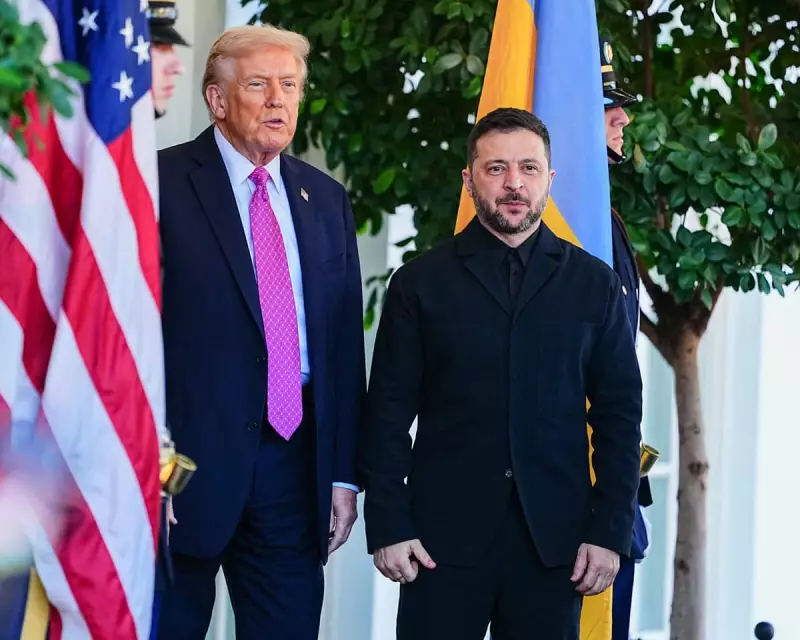
Europe stands at a critical crossroads as Ukraine's future hangs in the balance, with secret peace negotiations between the United States and Russia threatening to impose a settlement that would reward aggression and undermine continental security.
The Leaked Peace Plan That Shocked Europe
European governments were reportedly blindsided by a 28-point peace proposal leaked to media last week that appeared heavily skewed in Russia's favour. The terms of this shocking plan would require Kyiv to surrender significant territory it currently controls, dramatically reduce its military capacity, provide amnesty for Russian war crimes, and permanently abandon NATO membership aspirations.
The leaked document contained such obvious Russian linguistic fingerprints that analysts suspect substantial Kremlin involvement in its drafting. Ukrainian President Volodymyr Zelenskyy told his citizens this proposal represents one of the most difficult moments in their nation's history.
Former US President Donald Trump reportedly delivered an ultimatum to Ukraine: accept Russia's demands by Thanksgiving or face the potential withdrawal of American intelligence and military support. Though Trump has since softened his deadline language, the pressure on Kyiv remains intense.
Europe Pushes Back Against US-Russia Negotiations
This isn't the first time European leaders have found themselves scrambling to respond to bilateral US-Russia initiatives. The situation echoes events from August when Trump welcomed Vladimir Putin in Alaska while European officials rushed to Washington to support Zelenskyy and contain the diplomatic damage.
Recent emergency talks in Geneva have reportedly produced some modifications to the original plan, with claims it now better upholds Ukraine's sovereignty. Trump's special envoy, Steve Witkoff, is expected to return to Moscow soon, suggesting negotiations continue behind the scenes.
European powers including France, Germany and the United Kingdom have assisted Ukraine in resisting the most punishing terms. Their motivation extends beyond solidarity - these nations might need to deploy peacekeeping forces to implement any eventual agreement.
Europe's Financial Leverage: The €140 Billion Question
The most potent weapon in Europe's arsenal may be a controversial €140 billion reparations loan for Ukraine, secured against frozen Russian central bank assets. These funds, mostly held in Belgian repositories, could transform Ukraine's near-bankrupt status and strengthen its negotiating position.
However, the proposal faces legal challenges and complex negotiations about how to distribute profits from investing these seized assets. The European Union must urgently decide whether to proceed with this bold financial move or find alternative funding sources.
EU foreign policy chief Kaja Kallas has publicly questioned Moscow's economic resilience, noting that measures like the EU ban on Russian gas imports are having significant impact. "They want us to believe they can continue this war forever. This is not true," Kallas told the BBC.
The Stakes for European Security
Analysts warn that accepting Russian territorial gains achieved through aggression would establish a dangerous precedent that could bring wider conflict closer to Europe's doorstep. The security of Ukraine's neighbours depends on preventing an unjust peace settlement.
Nathalie Tocci, director of the Italian Institute for International Affairs, told the Guardian: "If Ukraine capitulates as per Russia's plan, war in the rest of Europe is one step closer, and Europeans understand this. So it's not out of the goodness of their heart that they would stick with Ukraine, but because they understand that their own security is at stake."
Tocci suggests the most likely medium-term scenario involves the US and Russia reaching a bilateral agreement, potentially encouraged by American hawks including JD Vance, leaving Europe to continue supporting Ukraine independently. In this event, European nations should acknowledge the reality of working with Trump on Ukraine and prepare to continue the conflict without US involvement.
As negotiations continue, European leaders face their moment of truth: will they use their considerable economic and diplomatic leverage to ensure a just peace, or allow Ukraine's future to be determined in bilateral talks between Washington and Moscow?





